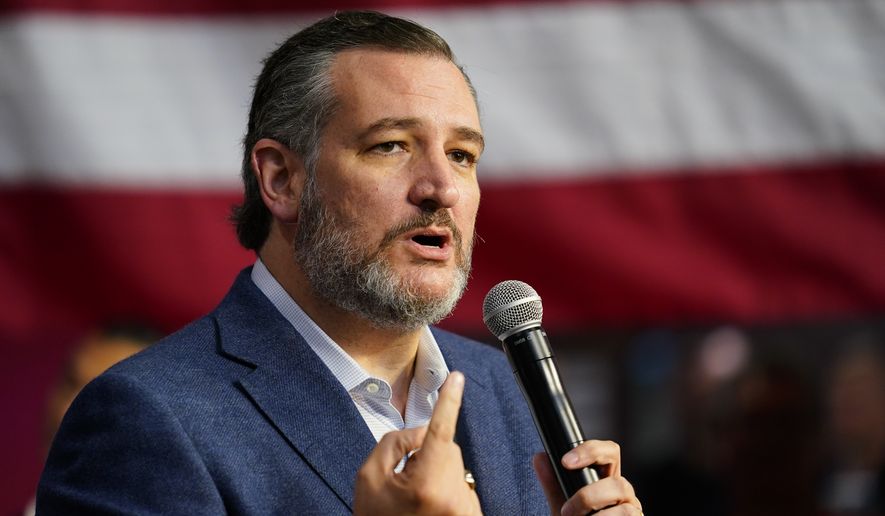The Supreme Court on Monday ruled for Sen. Ted Cruz in his dispute with the Federal Election Commission over his challenge to a law restricting post-election political donations to repay a candidate’s loan to their campaign.
The 6-3 ruling said FEC regulations on loan repayment for a political campaign ran afoul of free speech rights under the First Amendment.
“The First Amendment ’has its fullest and most urgent application precisely to the conduct of campaigns for political office,’” wrote Chief Justice John G. Roberts Jr. in the court’s opinion. “It safeguards the ability of a candidate to use personal funds to finance campaign speech, protecting his freedom ’to speak without legislative limit on behalf of his own candidacy.’”
Chief Justice Roberts was joined by the court’s five other GOP appointees.
The court’s three liberal justices dissented from the ruling, saying the FEC’s regulation helped to keep a check on corruption and to safeguard the public between politicians and donors seeking favors.
“The theory of the legislation is easy to grasp. Political contributions that will line a candidate’s own pockets, given after his election to office, pose a special danger of corruption,” Justice Elena Kagan wrote in the dissent, joined by Justices Sonia Sotomayor and Stephen G. Breyer.
Mr. Cruz filed his lawsuit over federal campaign finance laws concerning candidates’ personal loans to their own campaigns.
The Texas Republican, who argued many times before the high court before his election, won his federal lawsuit in lower court against the FEC, striking down the agency’s limit on the amount of money a campaign can repay to a candidate who makes a personal loan to his election effort.
But the Justice Department took the lawsuit to the high court. A spokesperson did not comment Monday on the loss.
Mr. Cruz initially sued after the $250,000 cap prevented him from receiving a full repayment for his $260,000 loan to his 2018 reelection campaign. He challenged Section 304 of the Bipartisan Campaign Reform Act of 2002, which banned candidates from repaying personal loans of more than $250,000 from post-election contributions out of their campaign.
After Mr. Cruz won reelection, his campaign paid back its debts, but Mr. Cruz only got $250,000 due to the cap.
He sued to get the $10,000 balance and for the court to rule Section 304 unconstitutional, arguing that the campaign finance limit violated the First Amendment.
The FEC argued the limit doesn’t place an undue burden on free speech and is aimed at combating corruption.
A spokesperson for Mr. Cruz said the ruling on Monday was a “resounding victory for the First Amendment.”
“Sen. Cruz is gratified that the Supreme Court ruled that the existing law imposed an unconstitutional restriction on free speech that unfairly benefited incumbent politicians and the super wealthy. This landmark decision will help invigorate our democratic process by making it easier for challengers to take on and defeat career politicians,” the spokesperson said.
Deborah Hellman, a law professor at the University of Virginia, said the contributions now allowed by the ruling will likely lead to corruption.
“The contribution is used to repay the campaign’s debt to the candidate and thus the money ultimately goes into the candidate’s own pocket, unlike other campaign contributions,” she said. “Because these contributions are made after the election, the donor knows, rather than merely hopes, that the candidate is in a position to confer benefits.”
Liberals blasted the ruling, saying it came after other decisions from the justices weakening voting rights. They pointed to a 2013 ruling that struck down part of the Voting Rights Act and a 2021 ruling that sided with Arizona over the Democratic National Committee in challenging state law changes. The 2021 ruling bolstered a state’s right to implement its election laws.
“Today’s decision creates a shell game that will only serve to further undermine public faith in their elected officials. These loans could run into the millions of dollars and voters will now not know who bankrolled a candidate’s campaign until after the election,” said Karen Hobert Flynn, president of Common Cause.
• Alex Swoyer can be reached at aswoyer@washingtontimes.com.




Please read our comment policy before commenting.